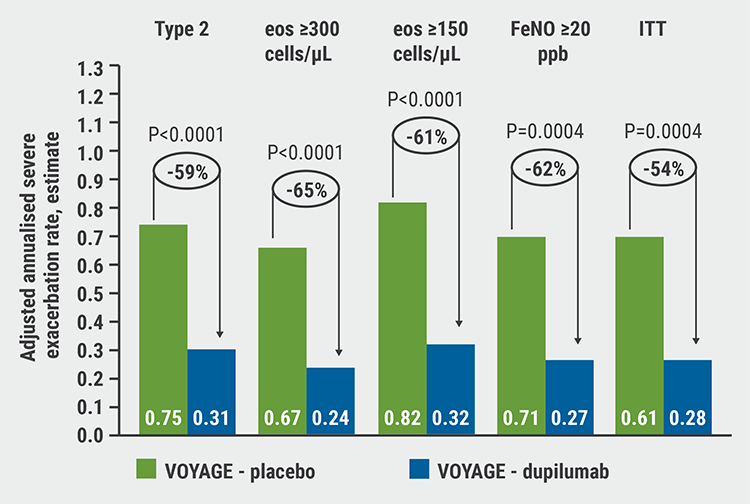It is known that obesity is an important risk factor for adult-onset asthma. “However, the association between obesity and markers of inflammation in this patient group has not been intensively studied,” Dr Helena Backman (Umea University, Sweden) explained during her presentation [1].
The aim of the current study was to investigate the association between obesity and inflammatory markers in adult-onset asthma. Since 1985, blood samples have been collected within different population-based studies in Northern Sweden. In 2019–2020, previous participants were invited to follow-ups including structured interviews, spirometry, measurements of exhaled nitric oxide (FeNO), skin prick testing, blood samples, and BMI. BMI was categorised as underweight (<18.5), normal weight (18.5–24.9), overweight (25–29.9), obesity (30–34.9), and severe obesity (≥35). Inclusion criteria included asthma-onset after 15 years of age.
In total, 251 patients participated in the study with a mean age of 63 years and mean BMI of 29.1. Of these, 0% had underweight, 22% had normal weight, 41% had overweight, 26% had obesity, and 11% severe obesity. Increased mean blood neutrophils (5.3x109/L) were observed in participants with severe obesity (P<0.001). Of participants with obesity, 83% had blood neutrophils ≥4x109/L compared with 32% of patients with normal weight. Between BMI categories, atopy, FeNO, and blood eosinophils did not differ significantly. Lower lung function for both FEV1 and FVC (83% and 82%, respectively) was seen in severe obesity as well.
In conclusion, severe obesity was strongly associated with blood neutrophils in adult-onset asthma. The identification of increased neutrophils in severely obese adults suggested that neutrophils play an essential role in the pathogenesis of obesity-related disease.
- Backman H, et al. Obesity and inflammatory markers in adult-onset asthma. Abstract 4215. ERS 2021, 5–8 September.
Copyright ©2021 Medicom Medical Publishers
Posted on
Previous Article
« Dynamics of environmental pollution during and after COVID-19 lockdown Next Article
Biomarkers do not discriminate severe from severe uncontrolled asthma »
« Dynamics of environmental pollution during and after COVID-19 lockdown Next Article
Biomarkers do not discriminate severe from severe uncontrolled asthma »
Table of Contents: ERS 2021
Featured articles
Letter from the Editor
COVID-19 Research: Looking Back and Moving Forward
Higher inflammation markers in COVID-19 patients with a first negative PCR test
Persistent fatigue following COVID-19
Risk of COVID-19-related morbidity and mortality in young and middle-aged adults
Respiratory Viral Infections: Insights from Recent Studies
Rhinovirus bronchiolitis increased risk of recurrent wheezing and asthma
COPD: Evidence Update
Livestock farming affected the airway microbiome of COPD patients
Reduction of COPD severe acute exacerbations by candidate vaccine
Paediatrics and Vaccinology
Better lung function in children with a healthy diet
Need for validated severity score in the assessment of bronchiolitis
Increased impact of air pollution on lung function in preterm infants
Pearls in Asthma Research
Biomarkers do not discriminate severe from severe uncontrolled asthma
Increased blood neutrophiles in patients with obesity and asthma
Blood inflammatory phenotypes associated with clinical symptoms of asthma
Related Articles
December 22, 2021
ICS plus LABA improves lung function in school-age preemie children
July 5, 2021
Men and women with COPD differ in many ways

© 2024 Medicom Medical Publishers. All rights reserved. Terms and Conditions | Privacy Policy

